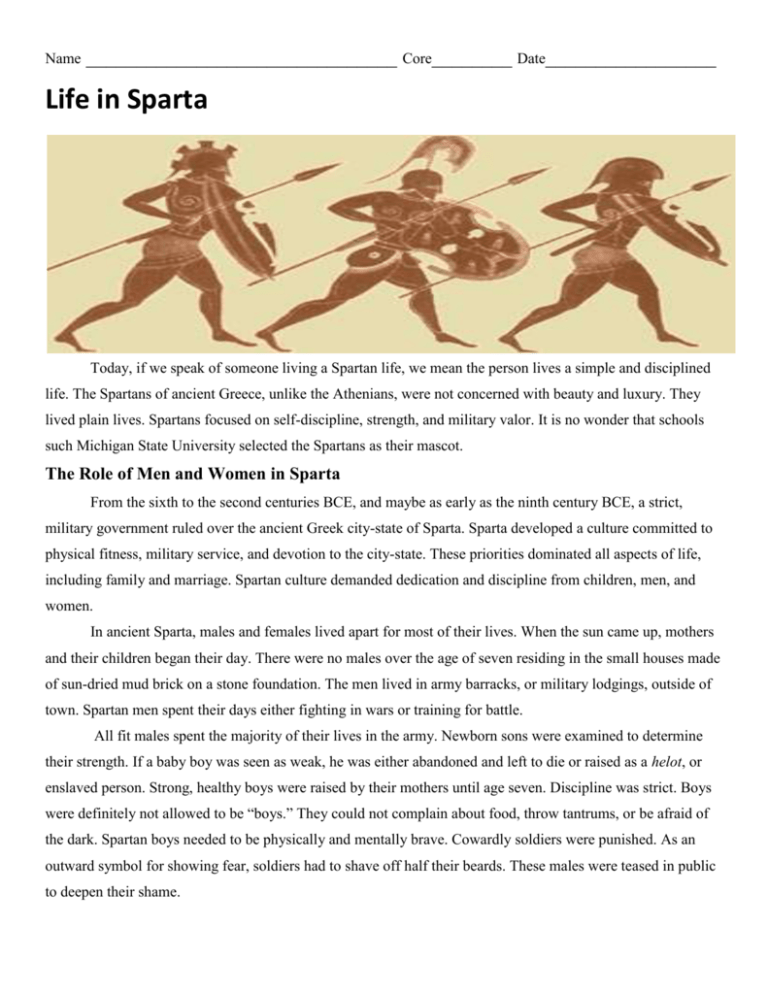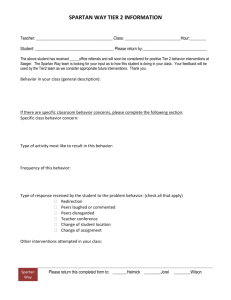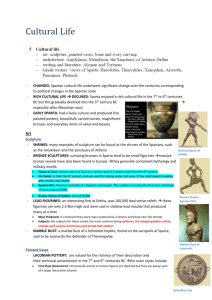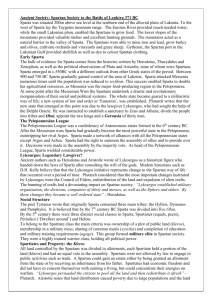The Role of Men and Women in Sparta
advertisement

Name _______________________________ Core________ Date_________________ Life in Sparta Today, if we speak of someone living a Spartan life, we mean the person lives a simple and disciplined life. The Spartans of ancient Greece, unlike the Athenians, were not concerned with beauty and luxury. They lived plain lives. Spartans focused on self-discipline, strength, and military valor. It is no wonder that schools such Michigan State University selected the Spartans as their mascot. The Role of Men and Women in Sparta From the sixth to the second centuries BCE, and maybe as early as the ninth century BCE, a strict, military government ruled over the ancient Greek city-state of Sparta. Sparta developed a culture committed to physical fitness, military service, and devotion to the city-state. These priorities dominated all aspects of life, including family and marriage. Spartan culture demanded dedication and discipline from children, men, and women. In ancient Sparta, males and females lived apart for most of their lives. When the sun came up, mothers and their children began their day. There were no males over the age of seven residing in the small houses made of sun-dried mud brick on a stone foundation. The men lived in army barracks, or military lodgings, outside of town. Spartan men spent their days either fighting in wars or training for battle. All fit males spent the majority of their lives in the army. Newborn sons were examined to determine their strength. If a baby boy was seen as weak, he was either abandoned and left to die or raised as a helot, or enslaved person. Strong, healthy boys were raised by their mothers until age seven. Discipline was strict. Boys were definitely not allowed to be “boys.” They could not complain about food, throw tantrums, or be afraid of the dark. Spartan boys needed to be physically and mentally brave. Cowardly soldiers were punished. As an outward symbol for showing fear, soldiers had to shave off half their beards. These males were teased in public to deepen their shame. While boys prepared to fight foreign armies, girls tended to domestic duties. Girls would spend part of the day learning to spin and weave. A teenage girl in Sparta could expect her father or another male to arrange her marriage. Spartan girls usually married in their late teens. This age may seem young by modern standards, but it was considered late by the ancient Greeks. Spartans delayed marriage, believing an older and stronger girl would produce stronger babies. Marriage was a way for families to increase wealth. Most girls did not have to have a dowry, or marriage settlement. However, those from wealthier families often did. Women at this time were allowed to own property. By the 300s BCE, several women owned large amounts of land. Some estimates had women owning one-third of the land in Sparta! At home, Spartan wives were expected to tend the crops, keep house, and raise small children. They taught their daughters how to manage a household in the absence of men. Female responsibilities far exceeded those of traditional Greek women, though they still included the customary preparation and storage of food. Dinner for women and girls at home might include lentils, porridge, and vegetables. After age seven, males did not eat at home. At age 30, men joined dinner clubs, paying monthly dues to cover the cost of the food. There, they might enjoy squid or octopus along with other seafood. These dinner clubs were a way to form strong bonds between men. Dinner for women and girls at home might include lentils, porridge, and vegetables. After age seven, males did not eat at home. At age 30, men joined dinner clubs, paying monthly dues to cover the cost of the food. There, they might enjoy squid or octopus along with other seafood. These dinner clubs were a way to form strong bonds between men. Spartan Life Family was far less important than the actual city-state. Men rarely visited their homes. If fathers and sons went home, the visit was short. They had to be back at the barracks before dawn. Even the wedding night was no exception. Honeymoons did not exist in Sparta. Men were taught to be loyal to Sparta, not to their individual families. Many families in Sparta raised chickens and goats. Thus, a typical breakfast included eggs and cheese, along with bread. Food was cooked on a hearth, or open fireplace, using charcoal for fuel. Wine was safer to drink than water, which was often polluted. Sparta was about 30 miles inland, so the Spartans ate less fish than those living along coastal cities. Only the very wealthy ate meat regularly. Girls from families without much money went to the public well for water. Because of long lines, wells became a place to socialize while they waited. Most children in Sparta received a basic education. Surprisingly, children learned to play musical instruments and dance. However, the arts and sciences were not valued by Spartan society, as in Athens. Spartan priorities were to groom fierce soldiers, win wars, and expand their territory. Since Sparta trained a population of warriors, this city-state found much success in warfare. After claiming victory in battle, Sparta enslaved people from conquered lands. Soon these captured helots, along with those native helots deemed weak at birth, outnumbered the native Spartans. The Spartans feared revolt amongst the enslaved. They used abuse and humiliation to control the growing number of helots. The helot’s main job was to farm the land. By using helots to do the farm work, Spartan men could spend more time training for the military. Training a Nation of Warriors Younger boys, under the care of an older male, lived in groups within the barracks. These youths were never given adequate food. Instead, they were encouraged to steal food without getting caught. According to legend, a boy died because he stole a fox and hid it under his cloak. When confronted, rather than reveal the fox, he suffered and eventually died as the fox ate his insides. Even in the winter, boys went barefoot. Being cold and hungry was part of training for war. Mothers also took part in toughening their sons and husbands. Women did not send their men off to war with hug goodbye and wishes for a safe return. Instead, the common farewell request was to come back either with their shield or on it. In other words, soldiers should return carrying the shield as a victor or be carried away dead on it. Death was ranked higher than cowardly behavior. Girls in Sparta were also trained as warriors. They learned to throw the javelin and discus. They practiced wrestling and running fast. It was believed that strong women would make strong children, particularly boys. Girls did not fight in battle; however, giving birth was viewed as a woman’s battle. The Decline of the Mighty Spartans In 480 BCE, the Greeks tried to stop a Persian invasion at Thermopylae, north of Athens. At Thermopylae, the Spartan King Leonidas soon realized they were far outnumbered by a Persian army of thousands. King Leonidas dismissed most of the Greek army, leaving only 300 mighty Spartans. In this uneven battle, it still took Persians several days to defeat the trained Spartan warriors. The Spartans fought until the end. Their bravery and strength inspired Greeks in other city-states, proving their reputation as brave soldiers. Sparta later suffered other losses in battles. Sparta failed attempts to regain their standing as a world empire, which led to their eventual decline. Regardless of their eventual fate, Sparta and the term Spartan will forever mean discipline, strength, and valor. __________________________________________________________________________________________ Question (8 points) 1. Today, a Spartan life means one that is marked by discipline and simplicity. Use details from the reading passage to show how Spartan society helped create this definition.











